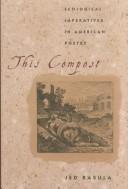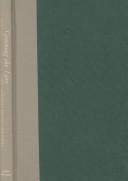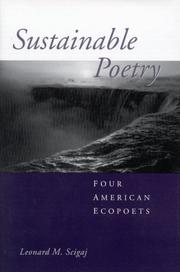| Listing 1 - 10 of 12 | << page >> |
Sort by
|
Book
ISBN: 1609385594 1609385608 Year: 2018 Publisher: Iowa City : University of Iowa Press,
Abstract | Keywords | Export | Availability | Bookmark
 Loading...
Loading...Choose an application
- Reference Manager
- EndNote
- RefWorks (Direct export to RefWorks)

ISBN: 0820323667 082034480X 0820344192 9780820344805 9780820344195 Year: 2012 Publisher: Athens
Abstract | Keywords | Export | Availability | Bookmark
 Loading...
Loading...Choose an application
- Reference Manager
- EndNote
- RefWorks (Direct export to RefWorks)
This Compost restores the dialogue between poetic language and the geophysical, biological realm of nature that so much postmodern discourse has sought to silence. Rasula surveys both the convictions asserted by American poets and the poetics they develop in their craft, all with an eye toward an emerging ecological worldview.
Book
ISBN: 0820345717 9780820345710 9780820332864 0820332860 0820345008 9780820345000 Year: 2013 Publisher: Athens London University of Georgia Press
Abstract | Keywords | Export | Availability | Bookmark
 Loading...
Loading...Choose an application
- Reference Manager
- EndNote
- RefWorks (Direct export to RefWorks)
"In 1844, Lydia Sigourney asserted, "Man's warfare on the trees is terrible." Like Sigourney many American women of her day engaged with such issues as sustainability, resource wars, globalization, voluntary simplicity, Christian ecology, and environmental justice. Illuminating the foundations for contemporary women's environmental writing, Fallen Forests shows how their nineteenth-century predecessors marshaled powerful affective, ethical, and spiritual resources to chastise, educate, and motivate readers to engage in positive social change. Fallen Forests contributes to scholarship in American women's writing, ecofeminism, ecocriticism, and feminist rhetoric, expanding the literary, historical, and theoretical grounds for some of today's most pressing environmental debates. Karen L. Kilcup rejects prior critical emphases on sentimentalism to show how women writers have drawn on their literary emotional intelligence to raise readers' consciousness about social and environmental issues. She also critiques ecocriticism's idealizing tendency, which has elided women's complicity in agendas that depart from today's environmental orthodoxies. Unlike previous ecocritical works, Fallen Forests includes marginalized texts by African American, Native American, Mexican American, working-class, and non-Protestant women. Kilcup also enlarges ecocriticism's genre foundations, showing how Cherokee oratory, travel writing, slave narrative, diary, polemic, sketches, novels, poetry, and expose intervene in important environmental debates"--
LITERARY CRITICISM / American / General. --- Nature in literature. --- Ecology in literature. --- Nature conservation in literature. --- Environmental protection in literature. --- American literature --- English literature --- Agrarians (Group of writers) --- Nature in poetry --- Women authors --- History and criticism. --- History and criticism --- Environmental protection in literature --- Nature conservation in literature
Book
ISBN: 1613761988 9781613761984 1558499555 9781558499553 9781558499546 1558499547 Year: 2012 Publisher: Amherst Boston University of Massachusetts Press
Abstract | Keywords | Export | Availability | Bookmark
 Loading...
Loading...Choose an application
- Reference Manager
- EndNote
- RefWorks (Direct export to RefWorks)
"Ecocritics and other literary scholars interested in the environment have tended to examine writings that pertain directly to nature and to focus on subject matter more than expression. In this book, Scott Knickerbocker argues that it is time for the next step in ecocriticism: scholars need to explore the figurative and aural capacity of language to evoke the natural world in powerful ways. Ecopoetics probes the complex relationship between artifice and the natural world in the work of modern American poets - in particular Wallace Stevens, Elizabeth Bishop, Richard Wilbur, and Sylvia Plath. These poets relate to nature as a deep wellspring of meaning, although they all avoid using language the way most nature writers do, merely to reflect or refer directly to the world. Each of these poets, in his or her own distinct way, employs instead what Knickerbocker terms sensuous poesis, the process of rematerializing language through sound effects and other formal devices as a sophisticated response to nonhuman nature. Rather than attempt to erase the artifice of their own poems, to make them seem more natural and thus supposedly closer to nature, the poets in this book unapologetically embrace artifice - not for its own sake but in order to perform and enact the natural world. Indeed, for them, artifice is natural. In examining their work, Knickerbocker charts a new direction for ecocriticism."--pub. desc.
Poetics --- Ecology in literature. --- Philosophy of nature in literature. --- Ecocriticism. --- Nature conservation in literature. --- American poetry --- Ecological literary criticism --- Environmental literary criticism --- Criticism --- History --- History and criticism. --- 20th century --- History and criticism --- Nature conservation in literature --- Ecocriticism --- Philosophy of nature in literature --- Ecology in literature --- Stevens, Wallace --- Criticism and interpretation --- Bishop, Elizabeth --- Wilbur, Richard --- Plath, Sylvia
Book
ISBN: 0415886309 9780415886307 9780203814918 9781136710469 9781136710506 9781136710513 9780415816380 0415816386 9786613441898 0203814916 1283441896 1136710515 1136710507 Year: 2012 Volume: 1 Publisher: New York: Routledge,
Abstract | Keywords | Export | Availability | Bookmark
 Loading...
Loading...Choose an application
- Reference Manager
- EndNote
- RefWorks (Direct export to RefWorks)
Environmental Criticism for the Twenty-First Century showcases the recent explosive expansion of environmental criticism, which is actively transforming three areas of broad interest in contemporary literary and cultural studies: history, scale, and science. With contributors engaging texts from the medieval period through the twenty-first century, the collection brings into focus recent ecocritical concern for the long durations through which environmental imaginations have been shaped. Contributors also address problems of scale, including environmental institutions and imaginations that complicate conventional rubrics such as the national, local, and global. Finally, this collection brings together a set of scholars who are interested in drawing on both the sciences and the humanities in order to find compelling stories for engaging ecological processes such as global climate change, peak oil production, nuclear proliferation, and food scarcity. Environmental Criticism for the Twenty-First Century offers powerful proof that cultural criticism is itself ecologically resilient, evolving to meet the imaginative challenges of twenty-first-century environmental crises.
Ecocriticism --- Ecology in literature --- Environmental policy in literature --- Environmental protection in literature --- Nature conservation in literature --- Ecological literary criticism --- Environmental literary criticism --- Criticism --- Environmentalism. --- Nature conservation in literature. --- Ecocriticism. --- Environmental protection in literature. --- Environmental policy in literature. --- Ecology in literature. --- Englisch.
Book
ISBN: 9789508452979 9508452978 Year: 2013 Volume: 59 Publisher: [Rosario]: Beatriz Viterbo Editora,
Abstract | Keywords | Export | Availability | Bookmark
 Loading...
Loading...Choose an application
- Reference Manager
- EndNote
- RefWorks (Direct export to RefWorks)
" ... consiste en un exhaustivo recorrido por un canon completamente desconocido y silenciado de textos de diversa factura y épocas, donde a lo largo de un siglo y medio se vienen expresando y representando las denuncias en relación a la destrucción del medio ambiente como consecuencia de la modernización y de las mitologías del progreso de la ideología liberal, y más recientemente del neo-liberalismo. Lo que más interesa de esta nueva investigación es la manera original de mirar y articular un corpus de narrativas de ficción, como así también otras representaciones culturales, con una nueva agenda teórico-reflexiva que echa mano de otros discursos críticos de áreas disciplinarias diversas, como aquellos que intersectan los estudios medioambientales, la problemática de los desechos y el reciclaje, la basura y el consumo, y la justicia social y medioambiental. Este libro de Gisela Heffes, además de ser innovador, parte aguas dentro de la disciplina de los estudios culturales latinoamericanos. Beatriz González Stephan." --Contratapa.
Ecocriticism --- Environmental protection in literature. --- Nature conservation in literature. --- Latin American literature --- Ecocrítica --- Protección ambiental en la literatura. --- Conservación de la naturaleza en la literatura. --- Literatura latinoamericana --- History and criticism. --- Historia y crítica.
Book
ISBN: 9789172475311 9172475315 Year: 2018 Publisher: Lund : Ellerströms,
Abstract | Keywords | Export | Availability | Bookmark
 Loading...
Loading...Choose an application
- Reference Manager
- EndNote
- RefWorks (Direct export to RefWorks)
"Under de senaste åren har begreppet ekopoesi alltmer etablerats i de nordiska samtalen om litteratur. Det har skett dels i förhållande till utvecklingen inom ett växande ekokritiskt forskningsfält, dels som ett resultat av att ett antal poeter, både debutanter och mer etablerade röster, framträtt med diktsamlingar som mer eller mindre tydligt har kategoriserats som ekopoesi. I Tala för det gröna i lövet diskuterar Peter Degerman om det finns särskilda möjligheter att behandla dagens brännande miljöfrågor i poetisk form, och om det i så fall går att tala om ett särskilt sätt att läsa ekopoetiskt. Genom att följa det ekokritiska forskningsfältets utveckling från 70-talet och framåt drar han paralleller mellan den framväxande miljöaktivistiska rörelsen och de estetiska traditionerna från romantiken, över beatpoesin, fram till dagens posthumanism och språkmaterialism" --
Ecocriticism. --- Ecology in literature. --- Ecology --- Environmental protection in literature. --- Green movement. --- Literature --- Literature, Modern --- Nature conservation in literature. --- Nature in literature. --- Poetics. --- Poetry. --- Scandinavian literature --- Swedish literature --- Aesthetics. --- Themes, motives. --- Themes, motives

ISBN: 0874175542 9780874175547 0874174945 9780874174946 Year: 2002 Publisher: Reno University of Nevada Press
Abstract | Keywords | Export | Availability | Bookmark
 Loading...
Loading...Choose an application
- Reference Manager
- EndNote
- RefWorks (Direct export to RefWorks)
Environmental ethics. --- Ethics in literature. --- Ecology in literature. --- Nature conservation in literature. --- Environmental policy in literature. --- Philosophy of nature in literature. --- Environmental protection in literature. --- Conservation of natural resources in literature. --- Nature in literature. --- American poetry --- Nature in poetry --- Environmental quality --- Human ecology --- Ethics --- History and criticism. --- Moral and ethical aspects
Book
ISBN: 9781137354198 Year: 2013 Publisher: Houndmills, Baskingstoke, Hampshire ; New York : Palgrave Macmillan,
Abstract | Keywords | Export | Availability | Bookmark
 Loading...
Loading...Choose an application
- Reference Manager
- EndNote
- RefWorks (Direct export to RefWorks)
"Analyzing Romantic conservative critiques of modernity found in literature, philosophy, natural history, and agricultural periodicals, this book finds a common theme in the 'intergenerational imagination.' The conservative intergenerational imagination cultivates a counter-narrative to the optimistic telos of progress and the punctual, liberal individual by contending that current generations receive land and culture as a gift from previous generations, and that the current generation bears the responsibility to preserve that gift for future generations. First locating the intergenerational imagination in Burke's Reflections and Wordsworth's epitaphic poetry, which chronicle the consequences of modernity and plead for intergenerational continuity in land use, the book then explores regionalist texts of the Romantic period, including Thomas Bewick's natural histories, Maria Edgeworth's Irish tales, William Cobbett's agricultural periodicals, and John Clare's poetry."--
Conservatism --- Conservatism. --- Criticism --- Criticism. --- Englisch. --- Generationsbeziehung. --- Intergenerational communication in literature. --- Konservativismus. --- Landnutzung. --- Literary criticism --- Literatur. --- Nachhaltigkeit. --- Nature conservation in literature. --- Politics and literature --- Politics and literature. --- Romanticism --- Romanticism. --- Romantik. --- History --- European --- English, irish, scottish, welsh. --- Poetry. --- Reference. --- 1800-1899. --- Great Britain. --- Großbritannien.

ISBN: 0813148014 9780813148014 0813121205 9780813121208 Year: 1999 Publisher: Lexington : University Press of Kentucky,
Abstract | Keywords | Export | Availability | Bookmark
 Loading...
Loading...Choose an application
- Reference Manager
- EndNote
- RefWorks (Direct export to RefWorks)
Over the past thirty years many poets have exhibited an increasing sensitivity to ecological thinking. But Leonard Scigaj is the first to define ecopoetry - Marked by its appreciation of nature as a series of self-regulating cyclic systems - as separate and distinct from nature or environmental poetry. Ecopoetry insists that the interests of humans must be balanced with the needs of nature. Focusing on the work of A. R. Ammons, Wendell Berry, W. S. Merwin, and Gary Snyder, America's foremost ecopoets, Scigaj explores each poet's depth of involvement in nature and his ability to use ordinary language that models biocentric ways of seeing nature. Just as a sustainable society does not depreciate its resource base, so a sustainable poetry does not restrict interest to textuality.
Ecology in literature. --- Nature conservation in literature. --- Environmental protection in literature. --- Nature in literature. --- American poetry --- Nature in poetry --- History and criticism. --- Snyder, Gary, --- Ammons, A. R., --- Berry, Wendell, --- Merwin, W. S. --- Ammons, Archie Randolph, --- Merwin, William S., --- Merwin, William Stanley, --- Shih-nai-te, --- Snainter, Gkary, --- ゲイリ-スナイダ-, --- Knowledge --- Natural history. --- Écologie --- Nature --- Poésie américaine --- Merwin, William Stanley (1927-....) --- Berry, Wendell (1934-....) --- Ammons, A. R. (1926-....) --- Snyder, Gary (1930-....) --- Dans la littérature --- 20e siècle --- Histoire et critique --- Critique et interprétation
| Listing 1 - 10 of 12 | << page >> |
Sort by
|

 Search
Search Feedback
Feedback About UniCat
About UniCat  Help
Help News
News